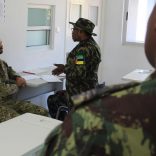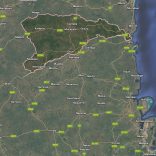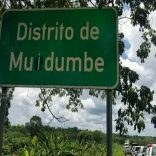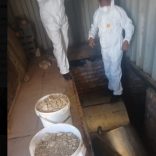Mozambique: EUMAM MOZ visits Role 1 Medical Facility at Katembe
Boustani tells US Court how contacts began with Mozambique – report

in file CoM
The defendant in a US investigation into Mozambique’s “hidden debts” said on Monday that he introduced the investment idea at a meeting with the Ministry of Science and Technology, where he met Teófilo Nhangumele in 2011.
Lebanese citizen Jean Boustani, 41, said in his first trial testimony that his first trip to Mozambique was in March 2011, for a presentation by the Mozambican Ministry of Science and Technology.
As a negotiator for Privinvest, “the world’s largest private shipbuilder,” Jean Boustani said he was “very interested” in “development opportunities” in Africa and took advantage of an invitation by a “business agent” named Basetsana Thokoane, a former agent of the South African Secret Services.
Jean Boustani said he had frequent professional contact with Basetsana Thokoane, whom he called “Bassi”, a business intermediary or lobbyist for Privinvest, who presented business ideas in Africa.
According to Boustani’s statement, the South African business agent had put forward proposals for Namibia, Kenya, Tanzania, Nigeria and Mozambique.
It was through Thokoane that Boustani claims to have met Rosario Mutota, former agent of the Mozambican State Information and Security Service (SISE) and his “business partner” Teófilo Nhangumele, at a meeting hosted by the Ministry of Science and Technology.
Boustani told the US court that he met Venâncio Massinga, then a minister, who gave him “a presentation on the opportunities in Mozambique”.
The Lebanese said that Rosario Mutota (or Cipriano Sioínio Mutota) had a “business partnership” with Teófilo Nhangumele.
Boustani said that at the first meeting with Mozambicans, “he spent a lot of time” with the minister and Nhangumele discussing opportunities in the country, including “discoveries of natural gas reserves, oil exploration, mining, tourism, agriculture and industry”.
The defendant narrated that the Mozambicans were “willing, hopeful and trying to attract foreign investors.”
“Because they informed me about their wealth in gas, natural resources and offshore, [I thought] it was crucial for them to start focusing on protecting their resources and develop the blue economy,” Boustani said, noting that the country has “3,000 kilometres of coastline”.
In 2011, Boustani introduced Privinvest – “Who we are, what we do, what we can do, what our added value is” in the shipbuilding industry, he said in his statement on Monday.
Boustani’s first impression of Nhangumele was that he was “very polite, very intelligent, professional, and a pleasant man”.
“The first time I was presented with an opportunity in Mozambique was, of course, thanks to Bassi,” the accused said, explaining that Mozambique and South Africa are border countries, “very close politically and culturally” and “share a lot of common history”.
Supposedly because of the process of decolonisation of African countries, Basetsana Thokoane met people who “hid and took refuge in Mozambique”, even in “times of political independence”.
“She told me that Mozambique was thriving because they had found massive reserves of natural gas and oil,” Boustani said regarding the 2010-2011 period.
In custody in Brooklyn in the United States since January 2, Boustani filed a statement on Monday via his lawyer, Michael Schachter, and has again pleaded not guilty to charges of conspiracy to commit fraud and conspiracy to commit money laundering.
Jean Boustani was previously the representative of shipbuilding company Privinvest, a service and equipment provider for the three Mozambican state-owned companies that took out international loans of about US$2.2 billion (€2 billion euros) and then defaulted on payments, leading to the discovery of Mozambique’s ‘hidden debts’.












Leave a Reply
Be the First to Comment!
You must be logged in to post a comment.
You must be logged in to post a comment.